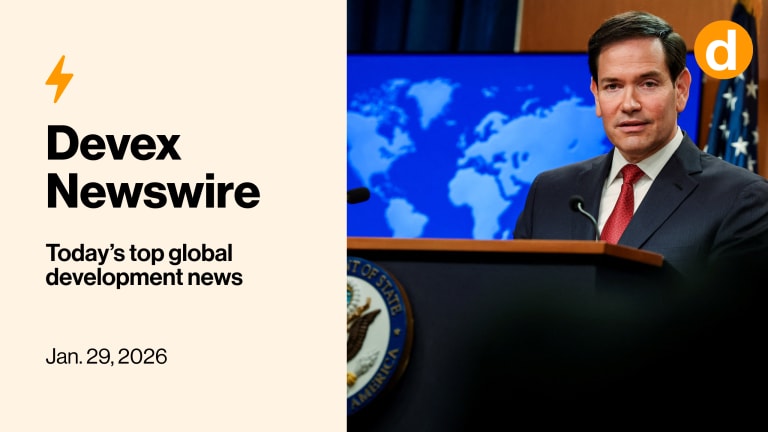
The corridors of USAID are getting a lot quieter these days — and it’s not because people are working from home. Even the walls are emptier.
Also in today’s edition: One program at the United Nations’ principal migration agency comes to a standstill, while the U.S. State Department resumes some lifesaving assistance.
Happening soon: With all attention focused on the rapidly changing U.S. foreign aid policies, what’s happening across the pond? Today at 9 a.m. ET (3 p.m. CET), we’ll be hosting a panel to review how U.K. aid has fared in the six months since Labour’s return to power. Join us.
Can’t attend live? Register anyway, and we’ll send you a recording!
Head on home
In the latest USAID staff shake-up (or shakedown depending on your perspective), furloughs are hitting hundreds of contractors in the Bureau for Humanitarian Assistance, or BHA — the result of President Donald Trump’s now-infamous stop-work order that put U.S. foreign aid on ice.
This is a preview of Newswire
Sign up to this newsletter for an inside look at the biggest stories in global development, in your inbox daily.
Some 500 USAID institutional support contractors working with BHA have already been furloughed, according to five well-placed sources. That adds up to 40% of the bureau’s workforce, my colleague Elissa Miolene writes.
“They’ve effectively just taken away the U.S.’ ability to respond to a humanitarian emergency,” a former USAID official tells us. “Even if they waive the funding [freeze], there are no people left to use the funding.”
Earlier, we reported that many of the agency’s institutional support contractors have already been, or are expected to be, let go — a shift that affects more than 50% of the workforce in the Global Health Bureau, a source with knowledge of the situation tells Devex.
Institutional support contractors make up sizable portions of the USAID workforce. While they function like regular staff, these contractors are employed by separate companies partnering with USAID, such as Credence Management Solutions, which sent an email yesterday telling employees: “If you are onsite [at USAID] … please head home.”
What else is getting thrown out of the building? Rows of pictures on the walls depicting aid programs. Apparently, the pictures did not align with the president’s agenda, a former USAID official tells Elissa.
Scoop: USAID furloughs hundreds of contractors from humanitarian bureau
ICYMI: Senior USAID officials put on leave amid fallout from executive order
Background reading: USAID global health contractors move to unionize
Having trouble keeping up with all the staffing upheavals? Don’t worry. My colleague Justin Sablich created an essential guide to track the impact on development work as the Trump administration realigns government policies and priorities with its “America First” agenda. Check out the tracker.
Migrating downhill
Meanwhile, thousands of employees could lose their jobs over at the Geneva-based International Organization for Migration, my colleague Colum Lynch scoops.
IOM, the United Nations’ principal migration agency, has ordered an immediate freeze to its U.S. resettlement program and is preparing the groundwork for thousands — possibly up to 5,000 — job cuts following the Trump administration’s sweeping pause on U.S. foreign assistance, according to humanitarian sources.
However, that figure is a worst-case scenario and the cuts could be smaller, particularly if the Trump administration moves ahead with restoring some funding.
Still, nerves are on edge. IOM has already begun sending out emails to staffers working on the U.S. Refugees Admissions Program, calling on them to stop work immediately. So far, no workers have been laid off, but those in the U.S. resettlement program could potentially begin receiving letters that their contracts will not be renewed, says one well-placed humanitarian source.
The move comes just days after the U.S. State Department wrote to IOM that it was immediately suspending funding for about 60 contract awards. It sent similar letters to the Office of the U.N. High Commissioner for Refugees and UNICEF.
IOM employs more than 20,000 people worldwide and has offices in 170 countries. The U.S. is the largest contributor, providing about 45% of more than $3 billion a year. IOM has a mandate to help governments, including the U.S., manage a more humane migration system.
Scoop: UN migration agency freezes US resettlement activities
Is he waivering?
In a rare bit of good news amid the funding fiasco, U.S. Secretary of State Marco Rubio approved a waiver for emergency humanitarian aid yesterday. It exempts “life-saving humanitarian assistance” programs defined as “core life-saving medicine, medical services, food, shelter and subsistence assistance, as well as supplies and reasonable administrative costs necessary to deliver such assistance,” according to a memo seen by my colleague Adva Saldinger.
But there are caveats: The waiver will not apply to activities that involve abortion; family planning conferences; diversity, equity, and inclusion programs; transgender surgeries; or other nonlifesaving assistance.
Read: State Department approves waiver for lifesaving humanitarian aid
+ Check out the latest news, in-depth analysis, and exclusive insights on how the Trump administration’s policies are reshaping global development.
To meet or not to meet
It’s one of those “I don’t know whether to laugh or cry” scenarios. My colleague Sara Jerving reports that USAID had set up a Q&A with implementing partners in an African nation to discuss the stop-work order — only to cancel the meeting because of the stop-work order.
USAID has told the partners that the meeting would be rescheduled once the order has been lifted.
Of course, a meeting about how organizations should navigate the stop-work order is likely to be a lot less relevant after it’s been lifted.
Read: USAID cancels stop-work Q&A with partners, citing stop-work order
Read the fine print
USAID released updated guidance yesterday for implementing partners that are likely starving for any kind of clarity at this point. Much of it we already knew — organizations need to hit the brakes and justify their missions within the State Department’s three-month review window — but there were a few new nuggets.
The notice flips how stop-work orders have been handled since last Friday. Previously, contracting officers alerted implementing partners on a case-by-case basis if they needed to halt their work. Now, implementing partners are required to independently pause all USAID-funded activities and report back to the agency.
The guidance also mentions the prospect of recovering costs, though the wording is (surprise, surprise) opaque.
“Because the funding pause will have schedule and cost implications for implementing partners, COs/AOs will negotiate equitable adjustments as a result of stop work orders, suspension notices, or termination settlements, as appropriate,” it states.
The notice encourages implementing partners to “review their specific award terms and conditions.” In other words, read your contracts with a fine-toothed comb, meticulously keep records, and know your rights.
Read: USAID issues blanket stop-work order, promising ‘equitable adjustments’
ICYMI: ‘Game-changing moment’ in US foreign aid throws everything into doubt (Pro)
+ Not yet a Devex Pro member? Start your 15-day free trial today to access all our expert analyses, insider insights, funding data, exclusive events, and more. Check out all the exclusive content available to you.
X-tremely diverging views
Democratic lawmakers have voiced their opposition to Trump’s foreign aid freeze, some diplomatically, others more bluntly. Sen. Chris Murphy, a Democrat from Connecticut, chose the latter approach in a starkly worded thread on the social media platform X, formerly Twitter.
“Look, Trump is trying to oversaturate us with nonstop chaos so we can’t react meaningfully to any one thing. But Friday’s global stop work order on almost all U.S. aid is dumb and murderous,” he wrote.
“First, this isn't a funding pause. It's a STOP WORK ORDER to almost all aid. Unprecedented. So today we just stopped feeding babies and housing refugees and mediating conflicts all around the world. Aid orgs are laying off staff and many programs will not restart,” he wrote. “Tons of kids are just going to die needlessly.”
“Aid programs were told to apply for ‘waivers’. But it’s a joke - there is no waiver program, no one to review the waivers. It's just cruel busy work to further overwhelm and punish aid agencies. Because cruelty is also the point,” he added.
But the post didn’t exactly elicit sympathy.
“We’re broke in case you haven’t noticed. How’s your checkbook look? Is your suicidal empathy causing you to show up at the bankruptcy court, too?” one poster replied.
“If we stop feeding their children, they will have fewer and that will help with global warming,” wrote another.
ICYMI: US lawmakers urge Secretary of State Marco Rubio to unfreeze aid
In other news
UNICEF is gravely concerned about the rising levels of PM2.5 air pollution in Thailand, which pose a serious threat to the health of approximately 13.6 million children nationwide. [UNICEF]
The Iran-backed Houthi militia has kidnapped more U.N. staff, including seven in Sanaa last Thursday, halting all U.N. humanitarian aid in Yemen. [DW]
With the future of U.S. aid funding for HIV treatments uncertain, experts warn that stopping access to HIV drugs could result in drug-resistant variants that could then spread. [The New York Times]
Sign up to Newswire for an inside look at the biggest stories in global development.








